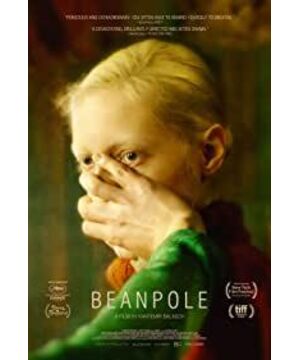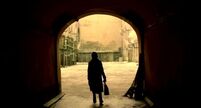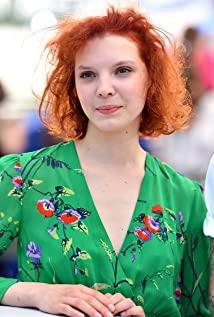"I saw so many dead people, so when I was on the front line, I thought, if I survive, I must find a good person and give birth to so many children."
【Sequences】
Leningrad in the first fall after the war.
In the kitchen of the collective apartment, Ai Muia’s male neighbor told her that the name Aia means violet in Greek. "Violet, what a beautiful flower!" He repeated eagerly, reaching out to wrap her waist. She immediately avoided, and her tall and thin body hugged Paska who was wrapped in a large towel.
Everyone can tell that she loves this child very much, bathes him tenderly, makes him laugh lovingly, and takes him to the hospital on the tram when the tailor’s neighbors can’t help look after him to work. The hospital chief deliberately set aside the routine supplies of her deceased colleagues, so that Iya and her "little men" could get more adequate rations during the early postwar period of lack of supplies.
The wounded also liked Paska. On the scorched earth full of holes, who would not cherish a child. They gathered together and enthusiastically performed the mood of various animals, letting the little guy guess. But Paska had no chance to know any animal in the short life of the war. He could neither answer the wolf bark nor recognize the pig nose. Instead, he said intermittently when an amputee waved his mutilated arm. "Little Bird". Everyone laughed friendly.
It was Paska's turn to perform. Everyone asked him to bark as a dog, but he was at a loss. A wounded person expressed understanding, saying that the children didn't know the barking of dogs. People had eaten up all the dogs long ago during the siege of Leningrad.
After a short silence, the rest of the people seemed to conceal something, but you sang and I sang the dog barking together. In this way, all kinds of dog barks echoed in the bright and tidy ward, and the happy and harmonious atmosphere seemed to be ordinary, but the warm and gentleness cast a beam of cold light on the countless loss and incompleteness in the flames of war.
(In contrast, the Soviet Russian Shepherd in the second half of the film made a high-profile appearance. In the official mansion, it must have survived the war safely.)
Paska treats Ia as her mother. Iya used to be a front-line anti-aircraft artillery. After recovering from the shock, she became a medical officer in a military hospital. At the beginning of the movie, the ambiguous relationship between the wounded and the nurse in the military hospital (Stepan and Iya) is often described in literary works. This semi-joking intimacy may have a positive effect on the psychological comfort of the wounded. But the scene continued until the two people were talking and laughing, and Stepan's empty eyes were alone. At that time he hadn't thought that his wife would find him. Except for his face, he didn't feel anything all over his body. He didn't know whether he could live or not, and what was the meaning of living. After the reunion with his wife, this sense of meaninglessness only became stronger. Before leaving, he apologized to his wife for the war, but what was his fault for the war.
The artillery fire not only drew clear and identifiable scars behind Iya's ears and her side, but also left seizures like epilepsy from time to time. This became the core clue of the film's form. It robbed her of her mind and made her withdraw from her body, ignorant and unable to control herself. It briefly became a heavy clock, clicking, clicking, clicking, unconsciously counting seconds.
After an episode, Iya found out that she had lost Paska forever. The camera was switched directly from the hospital ward to Iya's house. Paska has learned how to bark, and Iya is trying to sew something for him with fabric. The play between the two started from animals sacrificed in the war, but ended in the surprise sacrifice of their children after the war.
When he was young, he never had a chance to know that this mother who ended his life in silent loss of control was always waiting for the return of another mother who gave him life in the turbulent madness.
-
【mother】
Paska's real mother, Masha, Aya's comrade-in-arms, is the opposite of Aya in character and style. On the surface, Martha is more cheerful and sophisticated, especially with a skillful and numb attitude towards sex. She is accustomed to and good at using her body for the possibility of survival. During the war, she gets a piece of bread by approaching the person in charge of the logistics department. A new pair of boots, a vacation, etc. In the process of intercourse with countless men, she gave birth to a child, but because of the sacrifice of the child's father, she determined to stay on the front line to avenge her. She entrusted the child to the care of Iya who left early, and she fought with the army until the day when she captured Berlin. . But now she also has to endure the sudden pain, often suddenly shrinking her smile, as if the shadow is always hovering above her head. When Martha said "revenge", she seemed to be laughing at her innocence at the time.
And Ia, probably loved Martha a long time ago. This is by no means just the friendship of comrades-in-arms, but the silent, persistent, exclusive love and dependence. She cared for Martha's child wholeheartedly, but killed him fatally.
Iya tells Martha that Paška died in her sleep. She said that Paska did not consider herself a mother. No one knows the truth, no one exposes the white lie, but Iya is still very guilty. She was hostile to the man (Sasha) who tried to "take away" Martha; when Martha was emotionally down, she couldn't help running to kiss her eyes, cheeks and lips. She always rejects men, but promises to give birth to a child for Martha who has lost her fertility.
In the "surrogacy" incident, Martha sometimes seemed completely selfish and impatient. She took advantage of Iya's guilt and obedience, and used Yiya's "handle" of cooperating with the dean to help the wounded end their lives, forcing them to obey the decision and to realize their dream of becoming a mother.
However, Masha probably didn't know that giving birth to her own child meant something else to Iya. Iya loves Martha, so even her sick desires are fully accepted. She knew that the child was the only node that continued to connect the two lives, and knew that she could get Martha's attention with the help of pregnancy. Therefore, after learning that she had not conceived successfully, she was desperate in her jealousy and anger towards Sasha. I want to ask the dean to try again.
The dean asked her, what do you want a child for? Iya replied because I wanted to be her mistress.
Unlike Iya's silent guardian, Martha's attitude towards Iya is erratic. At first, she probably just regarded her as a meek and trustworthy friend. That day, at the request of the tailor's neighbor, Martha tried on a dress with red dots on a green background. She excitedly asked the tailor to allow her to take it off after a few turns, but she turned around and became more sad. Extreme joy is always easy to trigger extreme sorrow. The happiness that was readily available in the peaceful years was taken away by war, and no one intends to repay it.
When Iya watched Martha go round, she sat on the bed with her knees happily and laughed like a child. Later, seeing Martha sad, she immediately got up and ran to kiss her, as if it were comforting or expressing clearly. Mind. After that, Iya suddenly lost consciousness. Martha saw her twitching silently, laughing with anger, and suddenly kissed her back, but after a while, she pushed her away from her body as if she had recovered.
In the above snippet of the kiss scene, the wet green paint on the wall was accidentally rubbed on the face and body by the two people who were hugging and pushing, which seemed to indicate something. The green wall paint is spreading in the background, and the inherent color attributes of Masha and Ia have also changed. The red and green of the clothes are gradually intertwined, regardless of each other.
At the end of the movie, Martha learned after leaving Sasha's house that the tram stopped because of a car accident ahead. She vaguely heard from the crowd's discussion that a thin and tall woman was run over the wheel and fell into horror. After seeing the victim with her own eyes, she ran back to her residence desperately to confirm Iya's safety. She has always been calm and easy to smile, as if she suddenly had nothing. At this moment, it seemed that a feeling that had always been secretive suddenly broke out. (Of course it may be that I think too much, maybe Iya herself is still not that important to Martha; she is just worried that she will lose the possibility of getting a child again.)
-
【newborn】
The end of the film is still a struggle for self-deception.
Martha said that she accidentally got a nosebleed on the green dress and she must be scolded by the tailor. Iya Wannianju was sitting at the window wearing the red sweater that Martha brought her when she came back from the front line, and repeatedly tried to calmly tell Martha that her body was empty and there were no children. In terms of "empty", Iya used only "пустая (empty)" when she went to the dean to request another attempt to conceive, but now it is changed to "напрасная (meaningless)", although the former also has an abstract extension. The latter is completely "in vain."
But Martha covered Iya's mouth, not letting her say any more, the brutal action made Iya's mouth also slid blood. In this scene, red and green are replaced by the two.
After seeing this, I realized that the movie poster chose the moment when Martha prevented Iya from continuing. In the ruins of life that are difficult to rebuild, self-deception of "unbelief" seems so futile.
In the end, Martha held Ia’s hand as if she had never heard anything and described the future: she didn’t need anyone anymore, as long as she was with Ia and the child; that would be a boy who would be very smart when he grows up ; She will go to school; they will go to the movies together... Two people embrace and cry, like a child really exists, like beauty is right in front of them.
I heard a sigh from the audience: "It's terrible." On one side is the unrequited love with a bright future, and on the other is the illusory and hopeless new life.
But there is hope in the falsehood. At least the lives of the two are still there, and their dependence on each other is growing. Whether it is good or difficult, you can always live on. A child who is a symbol of the future may still have it. It's just that the pain of war will always accompany them. It's not just a "thank you for your sacrifice", a row of medals or a small bag of gifts can be smoothed.
---
Concluding remarks
The movie is like Baragov's blockbuster debut "Narrow", but still does not hesitate to use the richest saturated colors to define the relationship between the characters, and the collision of red and green does not detract from the beauty of the overall picture. The two colors interspersed and penetrated in the clothing and the environment, forming a silent dialogue.
At the same time, the film's narrative is extremely restrained, using visual expressions (looks, actions, non-verbal interactions) to replace the purely snake-footed text narration in many movies; except for the ending subtitles, there is no background music rendering in the whole film, only reserved And amplify the sound of the scene, relying on the original appearance and sound of the real scene to maintain the tension of time and space. Even the music in the subtitles is broken, and there are pauses between the clips, as if we once again enter the zone where Iya loses consciousness, click, click, click.
In addition, the plot of the film was inspired by Nobel Prize winner Alekseyevich's "No Women in War" , taking the perspective of his individual narrative. An interviewee in the book said that when he saw so many dead people on the battlefield, he thought that if he could survive, he must find a good person and give birth to so many children. Combined with Masha’s desire in the movie, the "child" in this sense is not so much a symbol of a huge future and unscrupulous selfishness, as it is a consolation that individuals have to find in order to heal the trauma, a compulsive filling, The need for substitution and continuation.
The director himself also mentioned that Iya’s character traits refer to Platonov ’s works (such as the heroine in Flo, who is waiting for a short reunion with her lover). However, the film breaks out of these texts and becomes its own style, allowing the story to contain infinite meanings that can be interpreted in a very small span of time and space and a simple network of relationships.
In addition, I especially like a few tram scenes. The camera doesn't follow the protagonist closely, but moves through the crowd deliberately or unintentionally, seemingly casually choosing the focus of the short follow-up shot. This kind of treatment allows the special plot characters to blend into the ordinary, although the depth of field is shallow, but still transparent.
All of the above have given a very literary story a mature and fascinating movie life. Even the flowers that have not yet fruited are shockingly beautiful.
View more about Beanpole reviews











